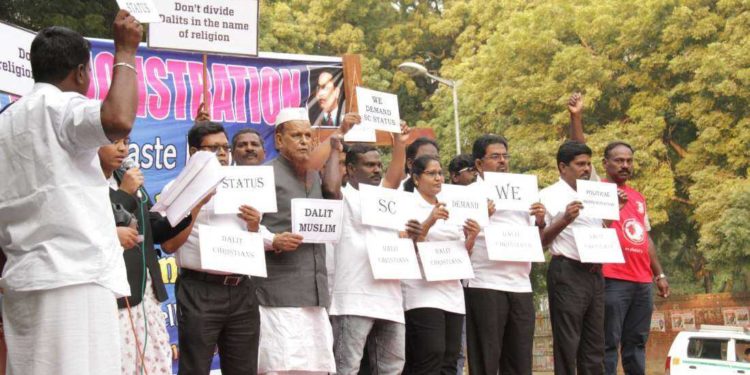Dalits who converted to Christianity or Islam are currently excluded from India’s affirmative action program
A protest seeking Scheduled Caste status for Christians from Dalit backgrounds in New Delhi on Dec. 4, 2018. (Photo: Bijay Kumar Minj/UCA News)
A provincial government in southern India has urged the Indian federal government to award scheduled caste status to Christians who were former untouchables to enable them to claim welfare benefits.
The Andhra Pradesh government on March 24 passed a resolution in its legislative assembly to support Christians from the Dalit community becoming a Scheduled Caste (SC) which, if approved by the central government could one day allow them social benefits they are currently excluded from.
These benefits include reservations in legislative bodies, educational institutions, and job quotas in state-run institutions.
“Somewhere or somebody has to start it for this noble cause, hence we appreciate and thank the Andhra Pradesh government for taking such a step as it is in the right direction and at the right time,” Father Vijay Kumar Nayak, secretary of the Catholic Bishops’ Conference of India (CBCI) Office for Scheduled Castes and Backward Castes, told UCA News on March 27.
“The Andhra Pradesh government’s support will have an immense impact”
“It’s the need of the hour,” he added.
Father Nayak said other states like Tamil Nadu, Bihar, Jharkhand, and West Bengal already support the claim by Dalit Christians to social benefits which are currently enjoyed by their counterparts from the Hindu, Buddhist and Sikh religions.
“The Andhra Pradesh government’s support will have an immense impact and will inspire many states to support Christians from a Dalit background who have been suppressed for decades,” the priest said.
The move by the state government, headed by 50-year-old Jagan Mohan Reddy, follows several representations made by Dalit Christians in the southern Indian state.
Dalits, who were former untouchables in the pre-independence era in India, are called a Scheduled Caste and were awarded social benefits as part of the affirmative action planned after the country’s independence from Britain in 1947.
However, Dalits who converted to Christianity and Islam were denied the benefits and the Supreme Court is hearing a two-decade-old petition by them, challenging the 1950 presidential order.
In the Supreme Court, the federal government of Narendra Modi has made it clear that it has no intention of extending social benefits to Dalit Christians and Muslims.
The federal government, led by Modi’s pro-Hindu Bharatiya Janata Party, has set up a three-member commission to look into the matter and submit a report.
Due to the sensitive nature of reservations in India, the Indian Catholic Bishops’ Conference (CBCI) has a dedicated arm to look at the welfare of Dalit Christians and people from the lower strata of society. Some 60 percent of India’s 25 million Christians are of Dalit and tribal origin.
Father Devasagaya Raj, former secretary of the CBCI Office for Backward Classes, hailed the move by the Andhra Pradesh government as the commission, headed by former Chief Justice of India K G Balakrishnan, is set to submit its report.
Father Raj said that several commissions in the past, like the Justice Ranganath Misra panel in 2007, have recommended social benefits for Christians and Muslim converts.
Setting up a commission is a tactic always used by the government to buy more time, the priest, however, told UCA News.
Latest News
Credit: Source link




